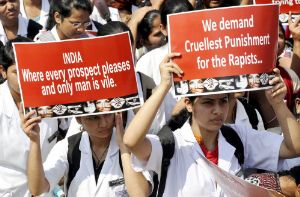
New Delhi, Feb 2: Shaken by the Nirbhaya case, the government on Friday approved a law prescribing death penalty for cases of rape which lead to the victim's death or her slipping into persistent vegetative state, going beyond the recommendations of the Justice JS Verma committee.
An ordinance cleared by the Union Cabinet seeks to treat rapes resulting in death of the victim or causing her to be in a persistent vegetative state as a crime belonging to the "rarest-of-rare" category for which courts can award death punishment if they so decide. For such cases, the ordinance proposes a minimum sentence of 20 years which can be extended to imprisonment until the natural life of the convict, or death.
[Click here to know what the govt accepted, partially accepted or didn't accept of Justice Verma panel report (PDF file)]
The ordinance was rushed through to beat the notification of Parliament's budget session which is due to begin on February 21. The notification would have prevented the issuance of an ordinance.
The ordinance, designed to change the Criminal Law (Amendment) Bill, 2012, and set to be promulgated shortly, has accepted Justice Verma committee's recommendation to treat voyeurism, stalking, disrobing of women and acid attacks as specific offences under the Indian Penal Code. The change will raise "eve-teasing" from being considered a minor offence to a serious crime attracting enhanced punishment.
The panel's recommendation for punishing those who knowingly employ a trafficked person has been accepted, with the government proposing a maximum sentence of five years for the guilty.
It has also accepted the recommendation of the committee, set up in response to the public upsurge over Nirbhaya rape case, to raise the maximum punishment for rape from the existing 10 years to life. For repeat offenders, the life imprisonment will cover his entire life and not just 14 years as is usually the case now.
Government has also embraced the recommendation that rape committed by a "person in authority" — a term that covers public servants and officers of police and Army — be punished by a minimum 10 years of rigorous imprisonment that can be extended to life.
However, it did not agree with the committee led by the retired Chief Justice of India that rape should not be made a gender-neutral crime. Accordingly, the expression "rape" in law is proposed to be replaced by "sexual assault".
10 years in jail for rape by 'person in authority'
Government has also turned down the committee's recommendations for criminalizing marital rape even in cases where the wife is above 16 years of age, and for punishing command officers who may fail to prevent rapes by subordinates.
The issue of whether the age of a juvenile should be reduced will be treated separately when the Juvenile Justice Act is reviewed.
Law minister Ashwini Kumar described the provisions of the ordinance as "path breaking". He said, "The changes proposed will bring in an effective and purposive law to protect the dignity of women."
He also said the ordinance, drafted with a sense of unprecedented urgency, reflected the UPA government's responsiveness to people's heightened sensitivities, as revealed in the aftermath of the Nirbhaya case, towards crime against women. "We have redeemed the pledge that we made," he said.
But women's rights activists were not pleased, and complained of a letdown. They are upset over the government's refusal to recognize marital rape as an offence, failure to hold command officers accountable for rapes by their subordinates and omission of rapes by armed forces as a category.
Sources in the government defended the provisions as bold, and pointed to a number of Justice Verma committee recommendations being accepted completely.
The law minister said the ordinance seeks to change provisions of Criminal Law (Amendment) Bill which is being examined by a parliamentary standing committee in the light of the recommendations of the Justice Verma committee.
The Justice Verma committee's recommendations have been widely welcomed as a new bill of rights for women.








Comments
Add new comment